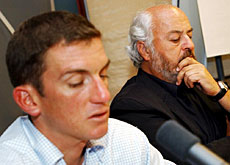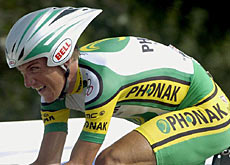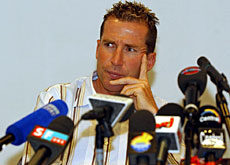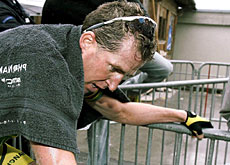IOC says Hamilton can keep Olympic gold

Olympic cycling champion Tyler Hamilton has been told he can keep his gold medal after the results of a drug test at the Athens Games proved inconclusive.
But the United States-born rider remains suspended from Switzerland’s Phonak team after failing a second doping test.
Earlier this week it emerged that Hamilton had failed two separate doping tests at the Athens Olympics and at this month’s Tour of Spain.
But on Thursday the International Olympic Committee (IOC) said a back-up drug test had proved inconclusive and Hamilton could keep his medal.
Hamilton tested positive for signs of blood doping in the initial “A” sample on August 19 after his victory in the time-trial race in Athens.
But the IOC said that analysis of the “B” sample had failed to confirm the original finding because of a “lack of enough intact red blood cells”.
As a result, the IOC said it had dropped its investigation into the case and “would not be pursuing sanctions regarding this matter”.
The IOC added that while the analysis of the second sample was inconclusive, this did not challenge the accuracy of the initial test.
Confusion
Although in the clear on one count, Hamilton still has a cloud hanging over his future.
Phonak announced on Thursday that a follow-up test on the blood sample taken during the Tour of Spain had come back positive.
In a statement published on the company’s website, Phonak said it had decided to convene a panel of experts “in order to achieve clarity as to the medical… reliability of these new blood testing tools”.
“The team’s goal is, and this is in the exact interest of Tyler Hamilton, that we have clarity in the end.”
Phonak said Hamilton would remain a member of the team but would not take part in races until the doping affair had been cleared up.
The two original tests on the cyclist suggested that Hamilton had undergone a blood transfusion – seen as a way of boosting an athlete’s performance by increasing his or her red blood cell count.
But Phonak, which has threatened to fire Hamilton if he fails to prove his innocence, has expressed doubts about the validity of the tests for blood doping, which were only introduced at the start of this season.
Innocent
In a statement on Thursday, Hamilton repeated that he would prove his innocence.
“Hopefully with this scientific team, we can find a foolproof method to this test in order to prevent other athletes ending up in the same situation,” he said.
The International Cycling Union said that it had handed Hamilton’s file to the US Anti-Doping Agency in Colorado for further investigation.
If found guilty of blood doping, the 33-year-old rider could face a two-year ban from the sport.
Hamilton joined Switzerland’s Phonak team last year. Company chairman Andy Rihs said at the time that he was delighted to have signed up one of cycling’s biggest names.
His new star paved the way for the Phonak team to join the Tour de France.
Hamilton is the second Phonak cyclist to become embroiled in a doping scandal this summer.
Last month Oscar Camenzind tested positive for the blood-boosting hormone EPO just before the Olympic Games.
Phonak tore up his contract immediately. Camenzind, who has since announced his retirement from professional cycling, was also suspended from competition for two years.
swissinfo with agencies
Tyler Hamilton was born on March 1, 1971, in Marblehead, Massachusetts.
He made his professional debut for Montgomery Belle in 1995.
He joined US Postal in 1996 before transferring in 2002 to Denmark’s Team CSC.
His most notable victories have come in the Tour of Denmark in 1999 and the Dauphiné of 2000.
Hamilton has a two-year contract with Phonak.
Hamilton rode with Tour de France winner Lance Armstrong in the US Postal Service team for six years.
He left in 2001 to become the leader of Denmark’s Team CSC, which won the team competition at last year’s Tour de France.
He finished fourth in the 2003 Tour de France, but pulled out of this year’s event after two weeks because of a back injury.

In compliance with the JTI standards
More: SWI swissinfo.ch certified by the Journalism Trust Initiative



You can find an overview of ongoing debates with our journalists here . Please join us!
If you want to start a conversation about a topic raised in this article or want to report factual errors, email us at english@swissinfo.ch.